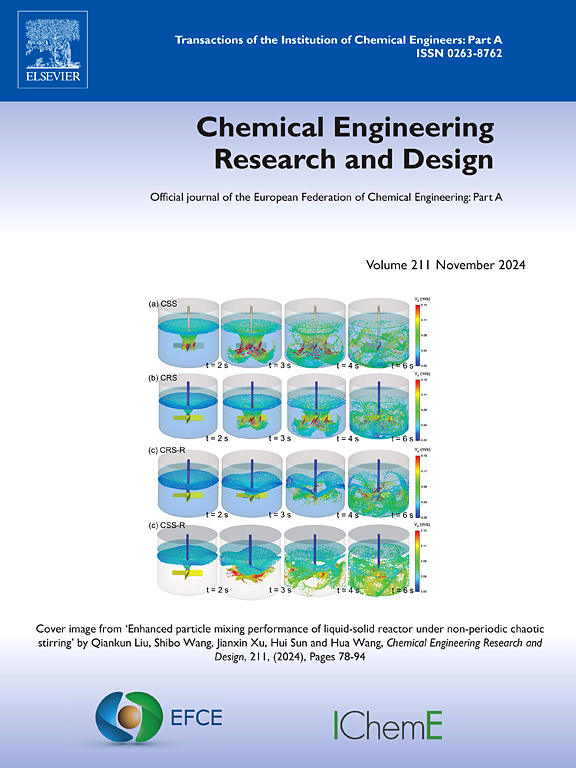Distributed optical fiber sensors for real-time tracking of fouling buildup for tubular continuous polymerization reactors
IF 3.7
3区 工程技术
Q2 ENGINEERING, CHEMICAL
引用次数: 0
Abstract
Early online fouling detection is expected to be a real step forward in the operation of continuous tubular reactors. As an online technology, the Rayleigh backscatter based Distributed Optical Fiber Sensor (DOFS) technology was evaluated with respect to temperature measurement resolution, reproducibility and the best online calibration method. Different coatings and terminations were characterized for emulsion polymerization reactors. Commercially available sensors with acrylate primary coatings, dual acrylate coatings, and polyimide coatings were all compared with each other. It is shown that the presence of a secondary coating significantly alters sensor behaviour. Sensors with only a primary coating showed a temperature resolution of 0.1 °C. Online calibration for temperature readout was carried out and validation tested on segments of fiber integrated in a 3D-printed reactor channel (diameter 1.5 mm). Acrylate coated sensors showed a deviation of 20 % for the calibration coefficients when inside the reactor channel compared to the online calibration, leading to errors in temperature measurement. Polyimide coated sensors showed a deviation of just 0.6 % in this validation test, demonstrating good capabilities for online calibration with accurate temperature measurements. The possibility of spatial and temporal monitoring of fouling buildup through a heat exchanging wall equipped with DOFS was evaluated.
用于实时跟踪管式连续聚合反应器结垢情况的分布式光纤传感器
早期在线污垢检测有望在连续管式反应器的运行方面迈出真正的一步。作为一种在线技术,对基于瑞利后向散射的分布式光纤传感器 (DOFS) 技术的温度测量分辨率、再现性和最佳在线校准方法进行了评估。对乳液聚合反应器的不同涂层和终端进行了鉴定。对带有丙烯酸酯主涂层、丙烯酸酯双涂层和聚酰亚胺涂层的市售传感器进行了比较。结果表明,二次涂层的存在极大地改变了传感器的性能。只有主涂层的传感器的温度分辨率为 0.1 °C。对温度读数进行了在线校准,并对集成在 3D 打印反应器通道(直径 1.5 毫米)中的纤维段进行了验证测试。与在线校准相比,丙烯酸涂层传感器在反应器通道内的校准系数偏差达 20%,导致温度测量误差。聚酰亚胺涂层传感器在此次验证测试中的偏差仅为 0.6%,显示了在线校准和精确温度测量的良好能力。对通过装有 DOFS 的热交换壁对污垢堆积进行空间和时间监测的可能性进行了评估。
本文章由计算机程序翻译,如有差异,请以英文原文为准。
求助全文
约1分钟内获得全文
求助全文
来源期刊

Chemical Engineering Research & Design
工程技术-工程:化工
CiteScore
6.10
自引率
7.70%
发文量
623
审稿时长
42 days
期刊介绍:
ChERD aims to be the principal international journal for publication of high quality, original papers in chemical engineering.
Papers showing how research results can be used in chemical engineering design, and accounts of experimental or theoretical research work bringing new perspectives to established principles, highlighting unsolved problems or indicating directions for future research, are particularly welcome. Contributions that deal with new developments in plant or processes and that can be given quantitative expression are encouraged. The journal is especially interested in papers that extend the boundaries of traditional chemical engineering.
 求助内容:
求助内容: 应助结果提醒方式:
应助结果提醒方式:


